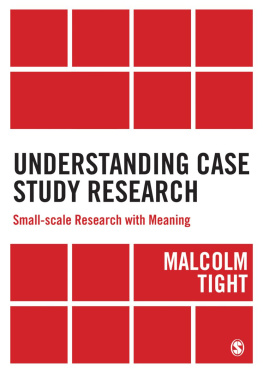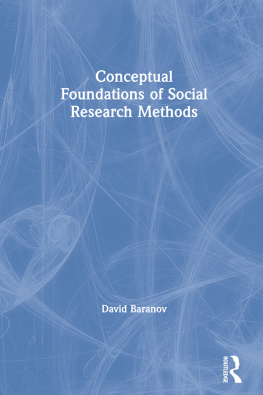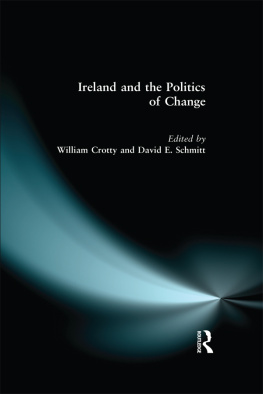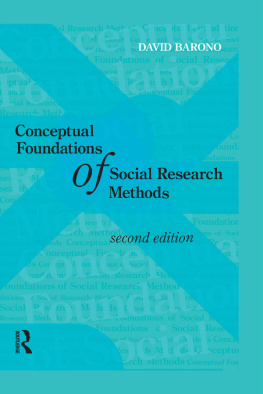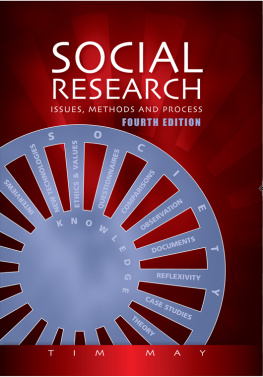Crotty - The Foundations of Social Research: Meaning and Perspective in the Research Process
Here you can read online Crotty - The Foundations of Social Research: Meaning and Perspective in the Research Process full text of the book (entire story) in english for free. Download pdf and epub, get meaning, cover and reviews about this ebook. year: 1998, publisher: Sage Publications, Ltd., genre: Romance novel. Description of the work, (preface) as well as reviews are available. Best literature library LitArk.com created for fans of good reading and offers a wide selection of genres:
Romance novel
Science fiction
Adventure
Detective
Science
History
Home and family
Prose
Art
Politics
Computer
Non-fiction
Religion
Business
Children
Humor
Choose a favorite category and find really read worthwhile books. Enjoy immersion in the world of imagination, feel the emotions of the characters or learn something new for yourself, make an fascinating discovery.

- Book:The Foundations of Social Research: Meaning and Perspective in the Research Process
- Author:
- Publisher:Sage Publications, Ltd.
- Genre:
- Year:1998
- Rating:5 / 5
- Favourites:Add to favourites
- Your mark:
- 100
- 1
- 2
- 3
- 4
- 5
The Foundations of Social Research: Meaning and Perspective in the Research Process: summary, description and annotation
We offer to read an annotation, description, summary or preface (depends on what the author of the book "The Foundations of Social Research: Meaning and Perspective in the Research Process" wrote himself). If you haven't found the necessary information about the book — write in the comments, we will try to find it.
Crotty: author's other books
Who wrote The Foundations of Social Research: Meaning and Perspective in the Research Process? Find out the surname, the name of the author of the book and a list of all author's works by series.
The Foundations of Social Research: Meaning and Perspective in the Research Process — read online for free the complete book (whole text) full work
Below is the text of the book, divided by pages. System saving the place of the last page read, allows you to conveniently read the book "The Foundations of Social Research: Meaning and Perspective in the Research Process" online for free, without having to search again every time where you left off. Put a bookmark, and you can go to the page where you finished reading at any time.
Font size:
Interval:
Bookmark:
T HE FOUNDATIONS
OF SOCIAL RESEARCH
This book emerges from several years of teaching a subject entitled Qualitative Research Methods. I have been guided by what students in that subject, and students whose research I have supervised, have found useful. I thank them for their feedback.
Some of the authors quoted in this book wrote at a time when there was little awareness of the oppression borne along in language. They quite happily write of man when they mean women and men. They make use of the generic masculine whenever they need pronouns. Since my readers need no help to recognise and deplore these usages, I have refrained from interrupting the text with [sic] many times over to point them out.
My wife, Christina, is a musician. She has rifled through the text for the odd allusion to music and art.
My sons, Martin and Luke, are technologists, one an audio engineer and the other on the way to becoming an electronic engineer. Some time or other, they tell me, they might be tempted to look at .
Lifes unfair! my daughter, Mikaila, declared at the age of six. In this same vein, ten years on, she feels may have something of interest if she ever gets around to reading them.
The book is dedicated to them, all the same.
MICHAEL CROTTY
APRIL 1998
T HE
FOUNDATIONS
OF SOCIAL
RESEARCH
Meaning and perspective in the research process
Michael Crotty

Copyright Michael Crotty
First published 1998
by Allen & Unwin
9 Atchison Street
St Leonards NSW 2065
Australia
All rights reserved. No part of this book may be reproduced or transmitted in any form or by any means, electronic or mechanical, including photocopying, recording or any information storage and retrieval system, without prior permission in writing from the publisher..
| SAGE Publications London | SAGE Publications USA |
| 1 Olivers Yard | 2455 Teller Road |
| 55 City Road | Thousand Oaks, |
| London EC1Y ISP | California 91320 |
| UK | |
 | |
| SAGE Publications India Pvt Ltd | SAGE Publications Asia-Pacific Pte Ltd |
| Bl/1 1 | 33Pekin Street #0201 |
| Mohan Cooperative Industrial Area | Far East Square |
| Mathura Road | Singapore 048763 |
| New Delhi 110 044 | |
| India |
British Library Cataloguing in Publication data
A catalogue record for this book is
available from the British Library
ISBN 978 0 76196 106 2
Library of Congress catalog record available
Set in 10.5/12.5 pt Goudy by DOCUPRO, Sydney
Printed in Singapore by KHL Printing Co. Pte Ltd
12 11 10 9 8 7
... many arrows, loosd several ways, Fly to one mark...
William Shakespeare, Henry V
They call it scaffolded learning. It is an approach to teaching and learning that, while careful to provide an initial framework, leaves it to the learner to establish longer term structures.
What is presented here is offered in this spirit. It is to be seen as in no way a definitive construction of the social research process but merely a framework for the guidance of those wishing to explore the world of research.
Research students and fledgling researchersand, yes, even more seasoned campaignersoften express bewilderment at the array of methodologies and methods laid out before their gaze. These methodologies and methods are not usually laid out in a highly organised fashion and may appear more as a maze than as pathways to orderly research. There is much talk of their philosophical underpinnings, but how the methodologies and methods relate to more theoretical elements is often left unclear. To add to the confusion, the terminology is far from consistent in research literature and social science texts. One frequently finds the same term used in a number of different, sometimes even contradictory, ways.
In response to this predicament, here is one reasonably clear-cut way of using terms and grasping what is involved in the process of social research. It is obviously not the only way in which these terms are used, nor is it being suggested that it is the only defensible way to use them. Equally, it is not the only way of analysing and understanding the research process. This is scaffolding, not an edifice. Its aim is to provide researchers with a sense of stability and direction as they go on to do their own building; that is, as they move towards understanding and expounding the research process after their own fashion in forms that suit their particular research purposes.
As a starting point, it can be suggested that, in developing a research proposal, we need to put considerable effort into answering two questions in particular. First, what methodologies and methods will we be employing in the research we propose to do? Second, how do we justify this choice and use of methodologies and methods?
The answer to the second question lies with the purposes of our researchin other words, with the research question that our piece of inquiry is seeking to answer. It is obvious enough that we need a process capable of fulfilling those purposes and answering that question.
There is more to it than that, however. Justification of our choice and particular use of methodology and methods is something that reaches into the assumptions about reality that we bring to our work. To ask about these assumptions is to ask about our theoretical perspective.
It also reaches into the understanding you and I have of what human knowledge is, what it entails, and what status can be ascribed to it. What kind of knowledge do we believe will be attained by our research? What characteristics do we believe that knowledge to have? Here we are touching upon a pivotal issue. How should observers of our researchfor example, readers of our thesis or research reportregard the outcomes we lay out before them? And why should our readers take these outcomes seriously? These are epistemological questions.
Already our two initial questions have expanded. We find ourselves with four questions now:
- What methods do we propose to use?
- What methodology governs our choice and use of methods?
- What theoretical perspective lies behind the methodology in question?
- What epistemology informs this theoretical perspective?
At issue in these four questions are basic elements of any research process, and we need to spell out carefully what we mean by each of them.
- Methods: the techniques or procedures used to gather and analyse data related to some research question or hypothesis.
- Methodology: the strategy, plan of action, process or design lying behind the choice and use of particular methods and linking the choice and use of methods to the desired outcomes.
- Theoretical perspective: the philosophical stance informing the methodology and thus providing a context for the process and grounding its logic and criteria.
- Epistemology: the theory of knowledge embedded in the theoretical perspective and thereby in the methodology.
In social research texts, the bulk of discussion and much of the terminology relate in one way or another to these four elements. What one often finds, however, is that forms of these different process elements are thrown together in grab-bag style as if they were all comparable terms. It is not uncommon to find, say, symbolic interactionism, ethnography and constructionism simply set side by side as methodologies, approaches, perspectives, or something similar. Yet they are not truly comparable. Lumping them together without distinction is a bit like talking about putting tomato sauce, condiments and groceries in one basket. One feels compelled to say, Hang on a moment! Tomato sauce is one of many forms of condiment. And all condiments are groceries. Lets do some sorting out here. Similarly, one may feel urged to do some sorting out when confronted by items like symbolic interactionism, ethnography and constructionism all slung together.
Next pageFont size:
Interval:
Bookmark:
Similar books «The Foundations of Social Research: Meaning and Perspective in the Research Process»
Look at similar books to The Foundations of Social Research: Meaning and Perspective in the Research Process. We have selected literature similar in name and meaning in the hope of providing readers with more options to find new, interesting, not yet read works.
Discussion, reviews of the book The Foundations of Social Research: Meaning and Perspective in the Research Process and just readers' own opinions. Leave your comments, write what you think about the work, its meaning or the main characters. Specify what exactly you liked and what you didn't like, and why you think so.


